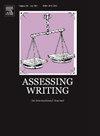How L2 student writers engage with automated feedback: A longitudinal perspective
IF 5.5
1区 文学
Q1 EDUCATION & EDUCATIONAL RESEARCH
引用次数: 0
Abstract
Recent qualitative research on L2 students’ use of AWE (automated writing evaluation) feedback reveals that learner engagement is not simply a binary process of accepting or rejecting suggestions; rather, it is influenced by various individual and contextual factors. Building on this foundation, the present study investigates how three Chinese EFL (English as a foreign language) learners at different proficiency levels engaged with feedback from Youdao Writing, a local AWE system, over a 16-week semester. Data were collected through screen-capture recordings, stimulated recalls and semi-structured interviews, focusing on their engagement at the affective, behavioral and cognitive levels. The findings reveal significant individual and longitudinal differences in the students’ experiences, perceptions, and emotional responses. These insights highlight the complexity of student engagement with automated feedback and suggest that instructional practices in EFL contexts should account for these individual and longitudinal differences to enhance the effectiveness of feedback. The study concludes with recommendations for integrating AWE feedback in a way that can foster deeper learner engagement and facilitate writing development.
第二语言学生作者如何参与自动反馈:纵向视角
最近对二语学生使用AWE(自动写作评估)反馈的定性研究表明,学习者参与不仅仅是接受或拒绝建议的二元过程;相反,它受到各种个人和环境因素的影响。在此基础上,本研究调查了三名不同熟练程度的中国EFL(英语作为外语)学习者在为期16周的学期中如何利用当地AWE系统b有道Writing的反馈。通过屏幕捕捉录音、刺激回忆和半结构化访谈收集数据,重点关注他们在情感、行为和认知层面的参与。研究结果显示,学生在经历、认知和情绪反应方面存在显著的个体差异和纵向差异。这些见解强调了学生参与自动反馈的复杂性,并建议在英语背景下的教学实践应该考虑到这些个体和纵向差异,以提高反馈的有效性。该研究最后提出了整合AWE反馈的建议,以促进更深层次的学习者参与和促进写作发展。
本文章由计算机程序翻译,如有差异,请以英文原文为准。
求助全文
约1分钟内获得全文
求助全文
来源期刊

Assessing Writing
Multiple-
CiteScore
6.00
自引率
17.90%
发文量
67
期刊介绍:
Assessing Writing is a refereed international journal providing a forum for ideas, research and practice on the assessment of written language. Assessing Writing publishes articles, book reviews, conference reports, and academic exchanges concerning writing assessments of all kinds, including traditional (direct and standardised forms of) testing of writing, alternative performance assessments (such as portfolios), workplace sampling and classroom assessment. The journal focuses on all stages of the writing assessment process, including needs evaluation, assessment creation, implementation, and validation, and test development.
 求助内容:
求助内容: 应助结果提醒方式:
应助结果提醒方式:


